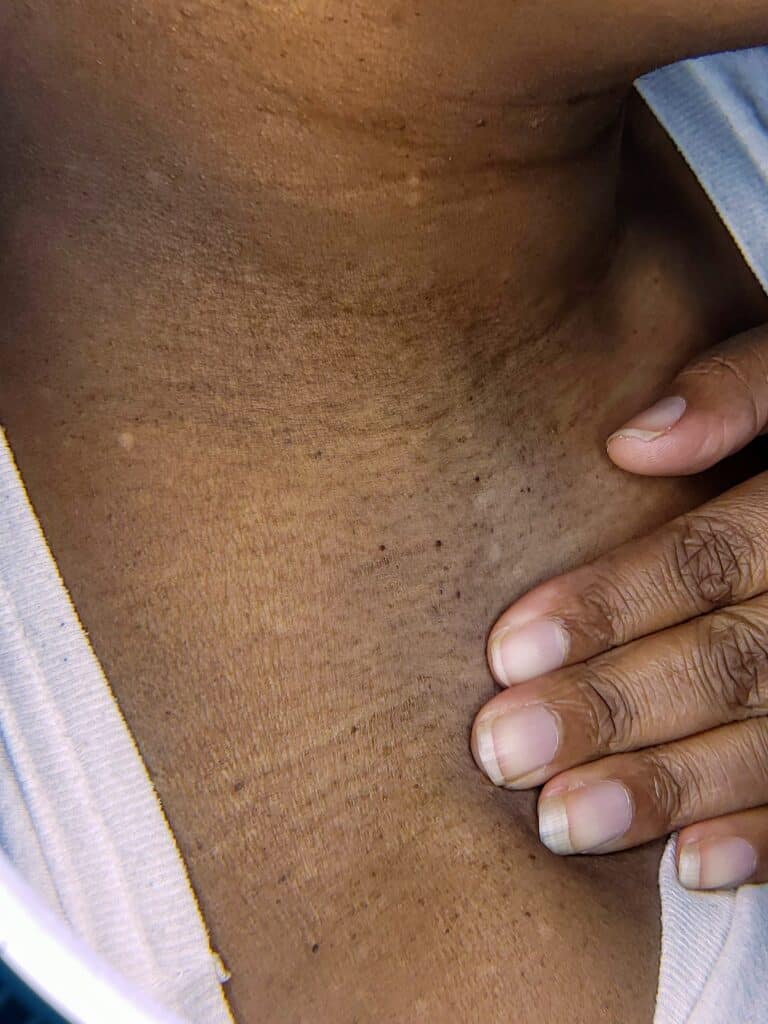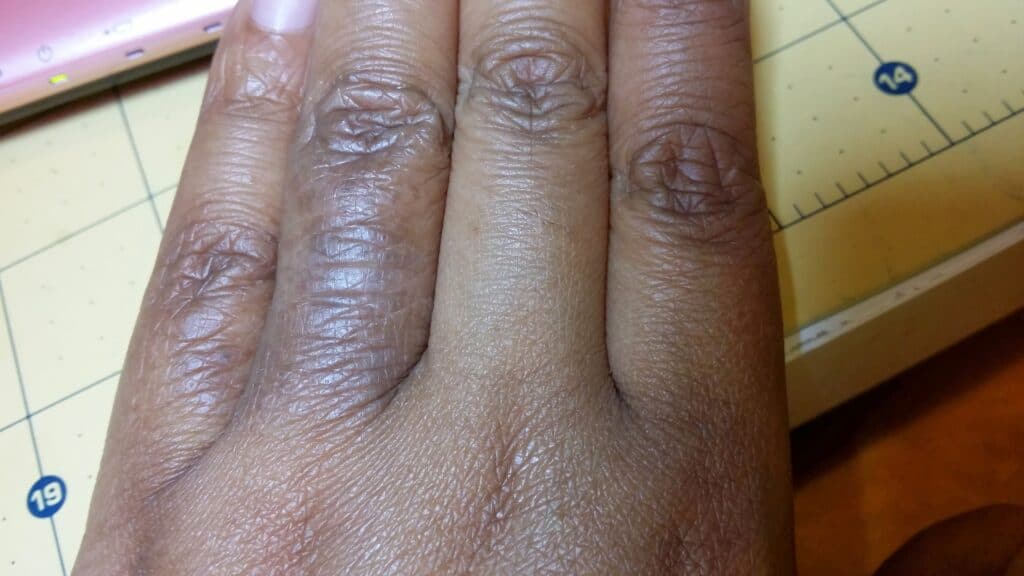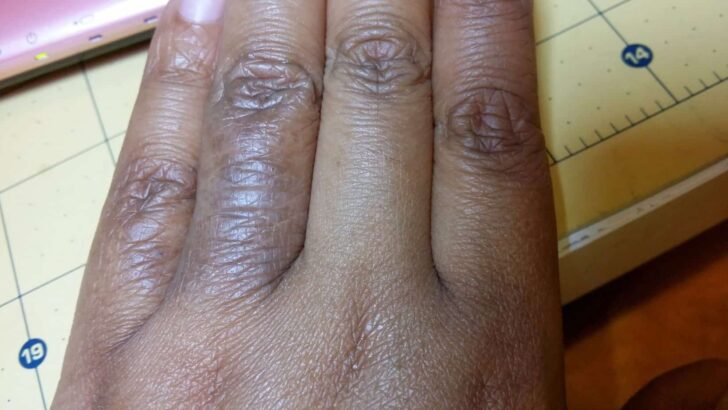I’ve known about atopic dermatitis or eczema for the better part of my life. My sister Jessica was diagnosed with it at a young age and didn’t grow out of it mostly until she was 17 years old. Our house was always filled with tubes of hydrocortisone, betamethasone, and reminders to not scratch otherwise we’d have to start all over with the application of her ointment. We learned early on that she didn’t just have eczema, but atopic dermatitis which is one of SEVERAL eczema conditions, and much more challenging to manage. Atopic dermatitis in darker skin tones presents unique challenges, and we're talking about those today.

I was compensated by Med-IQ through an educational grant from Pfizer, Inc. to write about the signs, symptoms, and treatments available for eczema/atopic dermatitis in communities of color. All opinions are my own.
Links to external sites are provided as a convenience and for informational purposes only. They are not intended and should not be construed as legal or medical advice, nor are they endorsements of any organization. Med-IQ bears no responsibility for the accuracy, legality, or content of any external site. Contact the external site for answers to questions regarding its content.
Atopic dermatitis is a red, itchy rash that can happen any time of the year; it is an intrinsic process influenced by the environment but not caused by it. So, if you notice that your skin flares up during a particular season, that’s the influence of it. My youngest daughter has flares in the winter because of no moisture in the air, while my eczema is at its worst during the summer BECAUSE of the moisture and heat.

With four children, I figured that one of them would probably be diagnosed with eczema, and sure as rain, the kid that looked the most like my dearly departed sister ended up being ‘it.’ We know from our pediatrician that children who are diagnosed with asthma are also often diagnosed with eczema and we were prepared for it – surprisingly so for our pediatrician. Experience makes you a bit weird.

Anyway, since winter time is coming up, and we’re a Black family, we wanted to take a bit of time to give some information about atopic dermatitis or eczema so that you can make appropriate decisions WITH the help of a medical professional.
First? We’re going to give some facts as they pertain to racial and ethnic disparities with the care of atopic dermatitis, so sit back and relax a bit.
o More than 31 million Americans have some form of eczema.
o Around 16.5 million adults in the US have atopic dermatitis, with 6.6 million reporting moderate-to-severe symptoms
o Although atopic dermatitis most commonly develops early in life, it can persist into adulthood for many patients
o 10% to 25% of children have atopic dermatitis; of which, approximately ⅓ have moderate-to-severe disease
o 5% to 10% of adults have atopic dermatitis (3% of elderly); of which, approximately ½ have moderate-to-severe disease
o Atopic dermatitis affects all races; however, it is more common among Black children and Black and Hispanic children are more likely to experience more severe cases
o Atopic dermatitis is most commonly associated with other allergic/atopic conditions such as allergy, asthma, hay fever, and food allergies
o Atopic dermatitis is also associated with several mental health conditions including ADHD, anxiety, and depression (the latter likely due from the distress atopic dermatitis causes; audience is less aware of this connection)
When my youngest daughter was diagnosed with eczema, I cried. Not because I felt like we wouldn’t be able to manage it, in fact, I KNEW we would. I just cried because it was like reliving everything all over with my sister Jessica knowing that she isn’t physically here to help walk me through this. Her expertise as someone who dealt with this would have been invaluable.
As if on target, my daughters hot spots are all the places where her joints fold and her back. My sister had the same spots as well as the area around her lips. She’d lick them for relief. It always hurt my heart to see her in the middle of a flare, AND to see how horrible her classmates could be when she was in the middle of a flare.
That isn’t the end of our story though. I’ve been diagnosed as well, but I have several hot spots. My ring finger – so it looks like I’m not married by societal standards, my neck, and my scalp. They can all be kind of embarrassing if I’m going through a flare, but I’ve learned to roll with the punches and treat with the help of my doctor.

I know that if I didn’t grow up with someone who dealt with eczema the way my sister did, I would have thought that I was just allergic to metal and gone about my day. Or that my daughter was just dealing with lack of proper moisturizer. Especially since our skin is full of melanin, we don’t have red splotchy areas. Our eczema presents as dark patches, that get super scaly.
Unfortunately, this isn’t something that will just go away with time. We had to adjust our lifestyle not only when I was younger with my sister, but now as a mother and patient with eczema. I can’t take super hot showers or baths like I want to, because that can cause a flare up. I also have to remember to moisturize properly using items often without scent so that won’t flare up our skin.
Taking care of two folks with eczema in our house can also get quite pricey. All of the specialty moisturizers cost a grip more than “regular” moisturizers and they shouldn’t, but that’s my soapbox and I’ll talk about it later.
Can we also talk about how this pandemic isn’t helping me? For the most part, my daughter is doing well, because she hasn’t left the house, so there isn’t a influx of sanitizer being used on her skin, but mine is ROUGH, so I have to pay even more attention to it during the season which usually brings me relief. We still have access to our doctors though for quick appointments virtually if we need, so I’m not worried on that front either.
Now, since I’ve told you my personal relationship with eczema, I’d like to offer resources that you can use in case you want to do a bit more research for yourself – but remember – this does NOT replace the guidance of your doctor or your child’s pediatrician.
· National Eczema Association: NationalEczema.org - https://nationaleczema.org/eczema-in-skin-of-color/
· Skin of Color Society (skinofcolorsociety.org)
· American Academy of Dermatology. Eczema Resource Center. (https://www.aad.org/public/diseases/eczema)
· National Medical Association (https://www.nmanet.org/)
· Hilton L. Eczema More Common in Black Patients. [Insights from Dr. Andrew Alexis] Dermatology Times November 24, 2019. https://www.dermatologytimes.com/view/eczema-more-common-black-patients
· Penn Medicine News. Hispanic and Black Children More Likely to Miss School Due to Eczema Than White Children. May 22, 2019. Available at: https://www.pennmedicine.org/news/news-releases/2019/may/hispanic-and-black-children-more-likely-to-miss-school-due-to-eczema-than-white-children.
· Guidelines: American Academy of Dermatology Atopic Dermatitis Clinical Guideline. (https://www.aad.org/member/clinical-quality/guidelines/atopic-dermatitis)
Med-IQ is conducting an anonymous survey and would appreciate your input. The survey will take less than 10 minutes to complete. Survey responses are shared only in aggregate. Your responses to these survey questions will provide Med-IQ with important information about your experiences with atopic dermatitis, which will help us develop future educational initiatives. Once you've completed the survey, you will have the option of providing your email address to be entered into a drawing administered by SOMA Strategies to win 1 of 10 $100 VISA gift cards. If you choose to enter, your email address will be used only to randomly draw the winners and notify them of their prize, and to send a follow-up survey as part of this same initiative.
You can complete the survey >>HERE<<


Katherine S.
Wednesday 9th of December 2020
I need to look into this more for myself. I'm not really dark on my legs and haven't noticed any dark patches, but they're the itchiest, especially in the winter. I'm thinking it's just a lack of moisture but I'll get it checked for sure. Thanks for sharing this!
Brenda J Wilson
Monday 7th of December 2020
Skin conditions for people with dry are brutal. I suffer with extremely dry skin. I changed some parts of my diet especially limiting sugar in all forms. Helps some. Supplements help too, but I have to refer back to to hydrocortisone ever now and then for relief. Sometimes, you have to find the right combination for yourself that brings you relief.